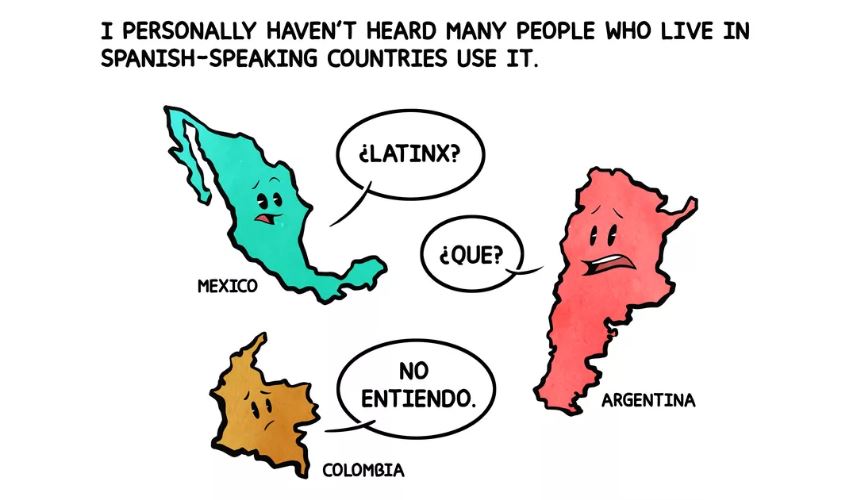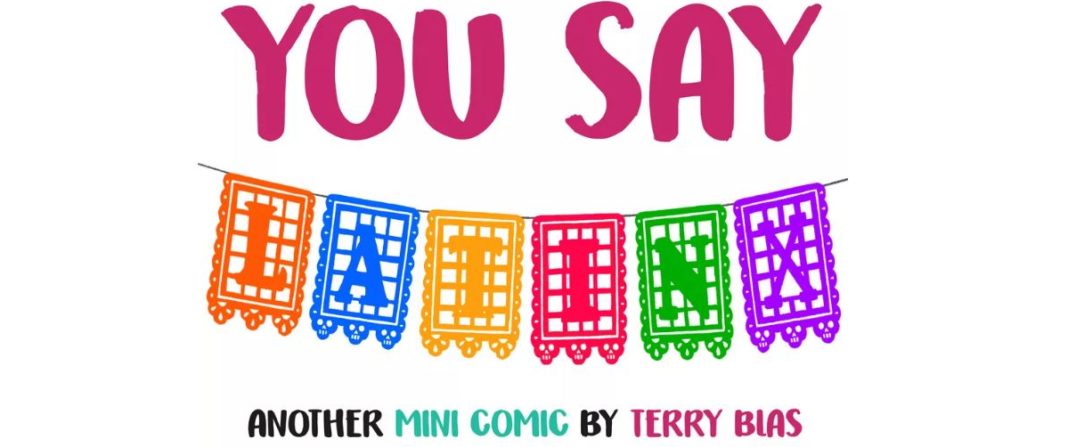The debate over the use of “Latinx” vs. “Latino” has been in a state of relentless intensity and swaying indignation over these past few years. Nothing suggests either side has the intention of backing down as the disagreement is starting to feel as if both sides are fighting over the very shape and identity of the Spanish language. Illustrator Terry Blas produced an online comic, called “You Say Latinx,” on precisely this and it should be required reading in these troubling linguistic times.
But first a little context.

Team Latinx argues that Spanish’s gendered structure does not take into account people who identify as non-binary and is therefore insufficient. Solution? Spanish better get ready for a big makeover if it wants to keep up and respect societal changes. If the times are a-changing, why shouldn’t language follow suit as well?
Team Latino argues that Spanish should stay just the way it is given the very nature of it is gendered and some of the proposed changes just don’t make any grammatical sense whatsoever, which simply makes them incorrect.
Blas’ comic does a great job of recognizing and explaining both sides while offering some sensible solutions that are fairly reasonable given the more current and visible shifts in identity and how they bring certain linguistic consideration with them.
I believe one of the big challenges of the Latinx/Latino debate lies in the location where this debate is actually taking place: The United States.
You Say Latinx, Terry Blas. As a Puerto Rican (which should signal certain biases and inclinations on this topic here), I often feel that the debate as a whole points more to an American problem than a Latin American one. I can understand how some groups feel that the use of “Latinx” violates the dictates of the Spanish language and that it basically stands as one culture’s imposition on another (American over Latin American), but I can also understand why other groups think the X should be added to the word on the basis of its intention, which is to account and make space for inclusivity. I favor the latter.
My experience has been that this type of discussion is more prevalent in the United States than it is in Latin America, although the latter has had to deal way more with the inherent dominance of the masculine form in Spanish and how that’s led to the development of sexism on a linguistic level in Spanish-speaking countries. I feel this detail is lost or glossed over in many of these discussions.
I don’t want to give the impression everyone in Latin America is okay with Spanish as it is and that it’s the US causing all the raucous. Sexism in Spanish is a problem with centuries of discriminatory tendencies that hold women back over men or even sees them as inferior and out of the norm precisely because we’ve been accustomed to thinking in the male form rather than in other identity forms. This debate is specifically binary rather than all-gender inclusive. Not everyone is fighting the same fight the same way everywhere. I would say Latin America has yet to advance in this regard in the many years it’s been discussed. Because of this, the use of “Latinx” is not as high up in the to-do list outside of the US.

Blas’ comic takes this into account, up to a point, but is more interested in proposing a kind of coexistence between all forms. There’s definitely a need for getting Spanish in shape so it can reflect the times and its advancements, but it doesn’t require the death of “Latino/Latina” in the process. You can identify as Latino on a personal level while acknowledging the existence of Latinx and not thinking Spanish is being robbed of its essence. You can identify as Latina just the same, putting forward the female form of identity within the language.
Perhaps I colored my reading of Blas’ comic with my own thought on the matter a bit much, but I think the comic argues that identifying as Latino doesn’t mean you can’t use “Latinx” or accept you can fall under it as well, much in the same way identifying as female doesn’t prohibit the person from using the “they/them” pronouns in social interactions. On the bigger social stage, inclusivity should take precedence. On a personal level, your identity remains yours and it shouldn’t feel threatened if someone adds an X when referring to the entire group.
To read Terry Blas’ comic “You say Latinx,” click here.









The Latinx label is only accepted by a small fraction of the community.
https://medium.com/@ThinkNowTweets/progressive-latino-pollster-trust-me-latinos-do-not-identify-with-latinx-63229adebcea
Comments are closed.